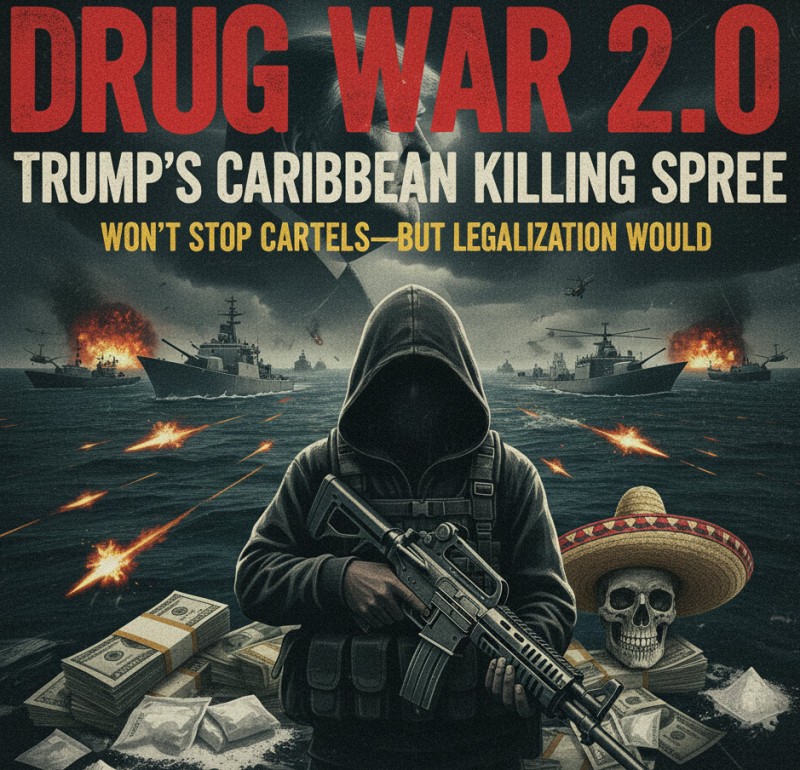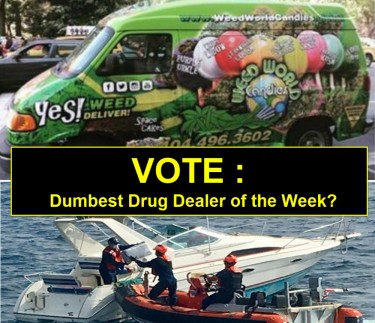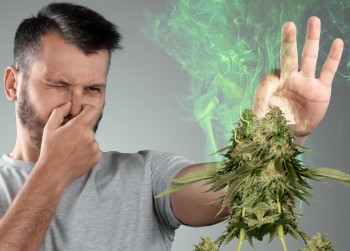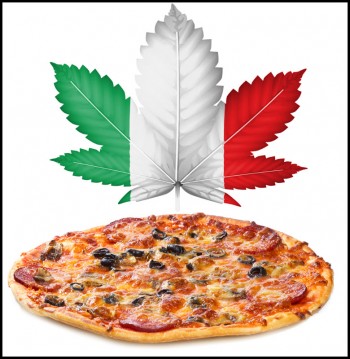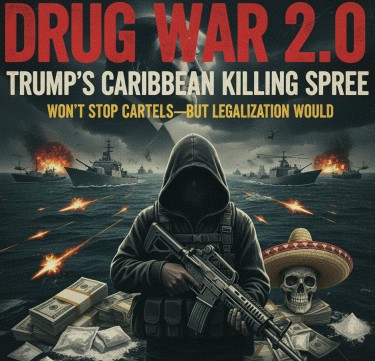
Drug War 2.0: Trump's Caribbean Killing Spree Won't Stop Cartels—But Legalization Would
Donald Trump, the self-proclaimed "anti-war" president who campaigned on ending endless conflicts, has found himself a new war to fight. In January 2025, he signed Executive Order 14157, formally designating eight Latin American cartels and gangs as Foreign Terrorist Organizations—the same legal classification used for ISIS and Al-Qaeda. By September, he'd escalated from designation to execution, launching a campaign of missile strikes against boats in the Caribbean Sea that has, by the administration's own count, killed at least 43 people across 10 separate attacks.
The justification, according to Trump and Defense Secretary Pete Hegseth, is simple: these boats are smuggling deadly drugs—specifically fentanyl—into the United States, threatening American lives. The solution, equally simple in their telling, is to blow the boats out of the water. "What will stop them is when you blow them up, when you get rid of them," Secretary of State Marco Rubio declared during a visit to Mexico.
There's just one problem with this narrative: it's demonstrably false. According to multiple sources including The Washington Post, U.S. officials, and Venezuelan media, the boats being destroyed aren't carrying fentanyl to the United States. They're carrying cocaine and marijuana to Trinidad and Tobago, with final destinations in Europe and Africa. The first boat struck on September 3rd was literally heading away from the United States when a U.S. military missile turned it into a fireball, killing 11 people.
The Trump administration knows this. They have to—their own intelligence sources confirmed the boats were heading to Trinidad, not Miami. Yet Trump continues claiming these strikes prevent deadly fentanyl from reaching American shores, even though fentanyl primarily comes from Mexico, produced in labs and smuggled across the border by U.S. citizens, not Venezuelan fishing boats in the Caribbean.
This isn't about public safety. It's about theatrics, flexing military muscle, manufacturing justification for regime change in Venezuela, and resurrecting the failed War on Drugs playbook with a 21st-century coat of paint. The "narco-terrorist" designation isn't policy innovation—it's rebranding. The missile strikes aren't strategic interdiction—they're extrajudicial executions that international law experts, human rights organizations, and the United Nations have condemned as potential war crimes.
And here's the infuriating part: none of this will work. Blowing up boats doesn't stop drug trafficking. It never has, and it never will. All it does is kill people—many of them fishermen, not cartel members—drive up drug prices, increase cartel profit margins, and create new recruitment opportunities for criminal organizations when desperate people see trafficking as their only economic option. Meanwhile, the actual solution—the one proven by decades of evidence and implemented successfully by multiple countries—sits right in front of us, ignored because it doesn't involve missiles and machismo.
Legalize drugs. Regulate them. Distribute them through legal channels. Cartels can't compete with free markets. It's that simple, and that terrifying to the politicians, defense contractors, and prison industry profiteers who've built empires on prohibition's failure.
The Militarization Playbook: Old Failures, New Branding
Let's be clear about what Trump's doing here: he's dusting off the exact same failed strategies that have defined the War on Drugs for over 50 years, slapping a "terrorism" label on them, and pretending this makes them innovative. It doesn't. It makes them more dangerous, more expensive, and no more effective.
The designation of cartels as Foreign Terrorist Organizations is clever legal maneuvering, nothing more. Traditional counternarcotics laws require things like evidence, due process, and Congressional authorization for military action. Terrorism designations bypass much of that. Under counterterrorism frameworks developed post-9/11, the executive branch has vastly expanded powers to conduct military operations, freeze assets, and take unilateral action without Congressional approval. Trump is exploiting those powers—built to fight al-Qaeda—to prosecute a drug war that couldn't be won through conventional law enforcement.
But here's the fundamental problem: cartels aren't terrorists. They're profit-driven transnational organized crime syndicates. Terrorism involves "premeditated, politically motivated violence perpetrated against noncombatant targets," usually intended to influence political outcomes through fear. Cartels use violence, yes—horrific violence—but their motivation is economic, not ideological. They want market control, not political transformation. They intimidate communities to protect trafficking routes and business operations, not to advance religious or political agendas.
The distinction matters legally and strategically. International law permits military force against terrorist organizations under specific circumstances related to self-defense and imminent threats. It does not permit the extrajudicial killing of criminal suspects in international waters simply because they're allegedly transporting narcotics. As legal experts have pointed out, drug smugglers are civilians under the law of war, and "the intentional targeting of civilians is a war crime."
Trump doesn't care. He's treated legal restrictions as inconvenient suggestions his entire life, and this is no exception. When reporters asked whether he'd seek a declaration of war to provide legal justification for the strikes, he essentially shrugged. "I think they'll back me up ultimately," he said of Congress, without bothering to explain what constitutional authority he's relying on. The answer, of course, is none. He's just doing it because he can, and betting that Republican-controlled Congress won't stop him.
The strikes themselves reveal the hollowness of the "drug interdiction" narrative. The U.S. has deployed guided missile destroyers, F-35 fighter jets, a nuclear submarine, and approximately 6,500 troops to the Caribbean—an unprecedented military buildup to combat small fishing boats. As Benjamin Gedan, who led the Venezuela portfolio at the Obama White House, noted: "It's such overkill in this naval deployment that there could be no justification if all the United States is trying to do is to attack a couple of small boats and intimidate drug traffickers."
The real target isn't drug trafficking. It's Venezuelan President Nicolás Maduro. Trump has offered a $50 million bounty for Maduro, authorized CIA covert operations inside Venezuela, and repeatedly threatened ground strikes against Venezuelan cartels. The drug war rhetoric provides convenient cover for what looks increasingly like preparation for regime change—a playbook the U.S. has executed repeatedly in Latin America with catastrophic results.
Colombia's President Gustavo Petro isn't buying it. He's accused the U.S. of "murder" after strikes killed Colombian citizens, including at least one confirmed Colombian fisherman. Venezuela's UN ambassador called the strikes "extrajudicial executions" and demanded Security Council investigation. Even Trinidad and Tobago—whose Prime Minister initially praised the strikes—is now investigating whether two of its citizens were among the killed.
Because here's the dirty truth Trump isn't advertising: many of these "narco-terrorists" appear to be poor fishermen, not cartel enforcers. The first boat struck departed from San Juan de Unare, a small fishing village on Venezuela's Paria Peninsula. Local media reported the town in mourning, publishing tributes with photos of eight residents killed in the attack. Families described their loved ones as fishermen, not drug traffickers. One survivor's sister in Ecuador said, "He's not a criminal," describing her brother as a fisherman she hadn't heard from in a year.
The Trump administration's response? Essentially, "Trust us, they were bad guys." No evidence presented. No trials. No due process. Just missiles fired from drones and helicopters, turning boats into debris and bodies washing up on Caribbean shores. This is the Obama-era "signature strike" program reborn—killing people based on "patterns of behavior" rather than confirmed identification, relying on intelligence that may be wrong, and accepting civilian casualties as the price of looking tough.
The economics make Trump's strategy even more absurd. Interdiction—stopping drug shipments through enforcement—has been tried for decades with consistent results: failure. For every ton of cocaine seized, ten more get through. For every boat destroyed, five more launch. The profit margins in drug trafficking are so astronomical that losses from enforcement are simply factored in as business expenses. Destroying boats doesn't destroy the market; it just makes successful shipments more valuable.
In fact, Trump's strikes are likely increasing cartel profits. When supply is disrupted through interdiction, prices rise. Higher prices mean higher profit margins for drugs that successfully reach market. Cartels can afford to lose boats and crew because the successful shipments more than compensate for losses. This is basic economics that every drug policy expert understands but that Trump either ignores or doesn't comprehend.
And let's address the fentanyl lie directly. Trump repeatedly claims these Caribbean strikes prevent fentanyl from reaching U.S. shores. This is provably false. Fentanyl consumed in the United States is overwhelmingly produced in Mexico, synthesized from Chinese precursor chemicals, and smuggled across the southern border—usually by U.S. citizens driving through legal ports of entry, because that's where detection is least likely. The boats Trump is blowing up in the Caribbean are carrying cocaine and marijuana to European and African markets, not fentanyl to Florida.
Why lie about it? Because fentanyl is the drug Americans fear most right now. It's responsible for approximately 48,000 overdose deaths annually. Linking the strikes to fentanyl makes them seem urgent and justified, even though they have nothing to do with the actual fentanyl crisis. It's cynical manipulation of legitimate public health concerns to provide cover for military adventurism and probable regime change planning.
The Solution Nobody Wants to Discuss: Legal Markets Kill Cartels
Here's what Trump, Biden before him, and decades of drug warriors refuse to acknowledge: there is a solution to cartel violence, drug trafficking, and prohibition's cascading harms. It's been proven effective. It's supported by evidence from multiple countries. It would save billions of dollars and countless lives. And it's politically unacceptable because it doesn't involve dropping missiles on poor people.
Legalize drugs. All of them. Regulate production and distribution. Make them available through legal channels.
Cartels can't compete with free markets. Period. The entire business model of drug trafficking depends on prohibition creating artificial scarcity and premium prices. A kilogram of cocaine costs about $1,500 to produce in Colombia. By the time it reaches U.S. consumers through the black market, it sells for $30,000-$50,000. That 2,000-3,000% markup exists purely because prohibition makes legal production and distribution impossible. Remove prohibition, and the markup disappears. Remove the markup, and cartel profit margins collapse.
Would legalization be complicated? Yes. Would it require careful regulation, age restrictions, public health infrastructure, and treatment resources? Absolutely. Would it be infinitely better than the status quo of mass incarceration, militarized enforcement, and empowered criminal organizations? Without question.
Look at cannabis legalization in states like Colorado and California. The illegal market didn't disappear overnight, but legal cannabis undercut black market prices so dramatically that illegal growers couldn't compete. Yes, there are still illicit cannabis operations, but they're a fraction of what existed under full prohibition. The legal market captured the majority of consumer demand simply by offering quality, safety, convenience, and competitive pricing.
Now imagine applying that model to cocaine, heroin, methamphetamine, and other drugs currently controlled by cartels. Production moves to legal facilities with quality control and safety standards. Distribution happens through regulated channels with age verification. Prices drop to reflect actual production costs plus reasonable markup and taxation. Cartels lose their primary revenue source virtually overnight.
"But Reginald," I hear the objection, "cocaine and heroin are dangerous! We can't just legalize them!" First, they're dangerous primarily because prohibition makes them unpredictable—users don't know purity, dosage, or adulterants. Regulated production eliminates those risks. Second, legalization doesn't mean endorsement or encouragement. We've legalized alcohol despite it killing more people annually than all illegal drugs combined. We've legalized tobacco despite it causing 480,000 deaths yearly in the U.S. alone. Legalization simply acknowledges reality: people use drugs regardless of legal status, and prohibition creates more harm than the drugs themselves.
Portugal decriminalized all drugs in 2001. Drug use didn't skyrocket—it declined. Overdose deaths plummeted. HIV infections from needle-sharing dropped dramatically. Problem drug use fell. Portugal redirected enforcement resources toward treatment and harm reduction, and the results speak for themselves. Switzerland, the Netherlands, and other countries have implemented various forms of drug legalization or decriminalization with similar success.
The U.S. could do this tomorrow. Federal legalization, coupled with regulation and treatment infrastructure, would devastate cartels more effectively than ten thousand missile strikes. Cartels would still exist—they'd pivot to other criminal enterprises like human trafficking, extortion, and gun smuggling. But without the financial shield of drug trafficking generating billions annually, they'd be far more vulnerable to law enforcement.
And here's the kicker: imagine redirecting the resources currently wasted on the drug war toward combating human trafficking. The illicit drug trade generates an estimated $400-$600 billion globally. Human trafficking, the second-largest illicit market, generates about $150 billion. If we eliminated drug prohibition and redirected even half the enforcement resources toward human trafficking, pedophiles, sex traffickers, and slave traders would face unprecedented pressure. Within a decade, we could dismantle trafficking networks that currently operate with relative impunity because law enforcement is too busy chasing drug users.
But that would require acknowledging that prohibition failed. It would require admitting that 50+ years of drug war policy accomplished nothing except mass incarceration, destroyed communities, empowered cartels, and wasted trillions of dollars. It would require politicians to do something brave and rational rather than something performative and violent. And apparently, blowing up fishing boats from drones is politically easier than admitting we've been catastrophically wrong for half a century.
The Sticky Bottom Line: Trump's Playing the Old Game With New Missiles
Trump's Caribbean killing spree isn't innovative drug policy. It's the same failed prohibition playbook with better weapons and slicker branding. The "narco-terrorist" designation doesn't make cartels more vulnerable—it just gives the executive branch legal cover for extrajudicial killings. The missile strikes don't stop drug trafficking—they make drugs more expensive and cartels more profitable while killing fishermen and civilians.
Everything about this campaign is cynical theater. Trump knows these boats aren't bringing fentanyl to America—his own officials confirmed they're heading to Trinidad. He knows blowing up boats won't end the drug trade—decades of interdiction failure prove it. He knows the legal justification is flimsy at best—which is why he hasn't sought Congressional authorization. None of that matters because the point isn't effectiveness; it's appearance.
His base loves it. They see military action against "narco-terrorists" and feel like their president is "doing something" about drugs, immigration, and Venezuela. They don't question whether it works. They don't ask about the bodies washing up on beaches or the families mourning loved ones who were never convicted of crimes. They don't care that the actual solution—legalization—is available, proven, and vastly more effective. They want to see America flex military power, and Trump is giving them the show they crave.
Meanwhile, real harm continues. Overdose deaths aren't declining because Trump blew up boats that weren't carrying fentanyl. Cartel violence isn't subsiding because poor fishermen got murdered by drones. The drug supply isn't disrupted because successful shipments more than compensate for interdicted ones. Nothing is improving except Trump's ability to claim he's "tough on drugs" despite accomplishing nothing.
The people who suffer most are the ones who always suffer under prohibition: the poor, the marginalized, the desperate people in Latin America who enter the drug trade because poverty offers no alternatives. Trump isn't solving poverty in Central and South America. He's not addressing the economic conditions that make trafficking attractive despite its risks. He's just killing people and calling it victory.
If Trump—or any politician—actually wanted to end cartel power, the path is clear. Legalize, regulate, and undercut the profit model that sustains these organizations. Create legal markets that cartels can't compete with. Redirect enforcement resources toward crimes that truly threaten human dignity—trafficking, exploitation, abuse. Treat drug use as the public health issue it actually is rather than a moral failing requiring punishment.
But that would require courage, humility, and acknowledgment of past failure. Much easier to launch missiles from safe distance, claim you're protecting Americans from drugs you're not actually stopping, and let the bodies pile up while your supporters cheer.
To Trump's followers who celebrate these strikes: you're cheering for extrajudicial killings based on evidence you haven't seen, targeting people who haven't been tried, disrupting drug routes that don't threaten you, and empowering the very cartels you claim to oppose by increasing their profit margins. You're supporting a policy that has failed consistently for 50 years and will continue failing regardless of how many missiles you drop.
When the boot of government crushes airways—whether through militarized drug war or any other overreach of executive power—don't be surprised you were duped. Trump is no anti-war president. He's just found a war his base approves of, wrapped it in counterterrorism language, and deployed military force without congressional approval against an enemy that poses no national security threat. If you're cheering this because it's Trump doing it, ask yourself whether you'd support the next Democratic president claiming the same powers to bomb other perceived threats without legal justification.
The War on Drugs didn't end. It just got rebranded with better weapons and worse legal cover. The solution remains the same as it's always been: end prohibition, regulate markets, and let cartels collapse when they can't compete with legal alternatives. Until we have the courage to implement that solution, everything else—including Trump's missile strikes—is just performance art written in blood.
Maybe we should be asking why the people in power find it easier to blow up boats than to legalize drugs. The answer might reveal more about their priorities than any press conference ever could.
